|
|
|
Sort Order |
|
|
|
Items / Page
|
|
|
|
|
|
|
| Srl | Item |
| 1 |
ID:
115958
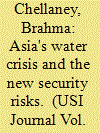

|
|
|
| 2 |
ID:
100151
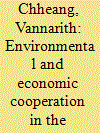

|
|
|
|
|
| Publication |
2010.
|
| Summary/Abstract |
Greater Mekong Subregional Integration has been promoted quite remarkably in the past decade with the support from key international and regional actors. Hard and soft infrastructure has been developed extensively. The road connection development in the Greater Mekong Subregion under the framework of East-West Corridor and North-South Corridor encourages more human and goods exchanges. The policy coordination and harmonization among the countries in the region have been upgraded but at a very slow pace. The future of the regional integration in the region is realizable through hard and soft infrastructure integration. As this article attempts to demonstrate, the main concern, though, still surrounds the issue of political willingness and real cooperation.
|
|
|
|
|
|
|
|
|
|
|
|
|
|
|
|
| 3 |
ID:
189250
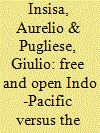

|
|
|
|
|
| Summary/Abstract |
Recent scholarship suggests that the thawing of diplomatic relations between China and Japan has caused a readjustment of Beijing’s Belt and Road Initiative and Tokyo’s Free and Open Indo-Pacific Vision towards an emerging complementarity. Through careful process-tracking, elite interviews, and analysis of Chinese and Japanese primary sources, this article instead demonstrates how, outside of the East Asian spotlight, Sino-Japanese geo-economic competition continues in South Asia and the Mekong subregion, fueled by power politics and a mutual distrust of each other’s initiatives. On the basis of this evidence, this article qualifies Sino-Japanese interactions as a quest and denial for spheres of influence, whereas the Japanese government aims at denying Chinese spheres of influence. In doing so, this article highlights how Japanese proactivism from Sri Lanka to Thailand, via infrastructure and government financing, has become a driver of growing non-traditional security cooperation with India, the U.S., and Australia.
|
|
|
|
|
|
|
|
|
|
|
|
|
|
|
|
| 4 |
ID:
148329


|
|
|
|
|
| Summary/Abstract |
Full securitization has largely been regarded as something negative that should be avoided. While acknowledging this, the present article adds that securitization moves that fail to succeed (i.e. that end in securitization failure) can, at least in the environmental sector of security, trigger positive outcomes if a given issue becomes (re)politicized rather than depoliticized. This is because securitization moves can be helpful in raising sufficient awareness of an issue to gain the attention of the relevant audience(s). Subsequently, the article argues, different audience strategies determine whether securitization moves are turned into securitization failure as (re)politicization or securitization failure as depoliticization. The article introduces different behavioral strategies that audiences can employ to reject securitization moves: the passive recipient strategy, the blocking strategy, and the active reshaping strategy. Only the latter indicates that an audience not interested in letting securitization moves succeed simultaneously seeks to have the issue in question be, or remain, a part of the political agenda. The article uses the spring 2010 Mekong crisis as a test case to support its theoretical arguments.
|
|
|
|
|
|
|
|
|
|
|
|
|
|
|
|
| 5 |
ID:
120195


|
|
|
|
|
| Publication |
2013.
|
| Summary/Abstract |
This article traces the evolution of China's policies aimed at promoting corporate social responsibility and sustainable investments, while assessing the extent to which its regulatory regime has succeeded in influencing the investment strategies of Chinese national companies across the developing world, specifically in Africa and the Mekong region. In an attempt to improve its international reputation, the Chinese government has stepped up its initiatives in recent years to oversee the practices of Chinese companies abroad and reorient the country's policies towards greater corporate responsibility. But while promising, these efforts have been largely impeded by weak policy implementation. As evinced from the African mining sector and the Mekong's hydropower industry, the diversity of corporate actors and their relative autonomy in making investment decisions, combined with lax governance in host countries and a long-standing concern with national development, have worked to hinder the effective regulation of Chinese overseas investments. Yet, that China, as a new country of origin of ODI, and Chinese firms are now making commitments to CSR and sustainability remains significant, indicating an important development in the country's "Going Global" strategy.
|
|
|
|
|
|
|
|
|
|
|
|
|
|
|
|
| 6 |
ID:
172472
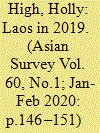

|
|
|
|
|
| Summary/Abstract |
Climate disruptions highlighted factors likely to shape the contours of climate change in Laos. Among these, regional relationships and resource-driven development continued to be important, as did inequality within Laos. Popular dissatisfaction with the capacity of the Lao state continued, exacerbated by environmental disasters and continuing limitations on free speech.
|
|
|
|
|
|
|
|
|
|
|
|
|
|
|
|
| 7 |
ID:
185233


|
|
|
|
|
| Summary/Abstract |
The contemporary US/Japan-Chinese rivalry and tension around dam building in the Mekong region is often mistakenly seen as the US and Japan’s reactive response to recently growing Chinese diplomatic and economic influence in the region. In fact, the United States and Japan have been critical architects of institutional and financial engineering for hydropower development in the Mekong region, which predates involvement by the People’s Republic of China (PRC). The factors and dynamics involved in significant lending regime shifts away from a liberal hydropower finance regime to an export credit driven model premised on Asian economic statecraft is an understudied topic. This article fills part of this gap through a case study of evolving hydro-financing regimes in Lao PDR from the 1970s to the present. The study draws on extensive ethnographic work in Laos, Japan, Thailand, and the United States with local and external political elites, hydro-financing technocrats, and business actors and gains additional insights from analysis of primary firm, institutional, and government documents. The article finds that the role of economic crises and their impact on the relative economic power of hydropower financing regimes as well as their ideational impact on borrower regimes are significant in explaining shifting patterns in lending regime dominance.
|
|
|
|
|
|
|
|
|
|
|
|
|
|
|
|
| 8 |
ID:
186354


|
|
|
|
|
| Summary/Abstract |
This article analyses the hydro-political behaviour of riparian countries in the Mekong River Basin (MRB) vis-à-vis India’s attitude towards the Brahmaputra and upstream China. It analyses transboundary water cooperation in the MRB and the active participation of the stakeholders and then compares it with the Brahmaputra River Basin (BRB). It argues that the water management practices in the MRB are comparatively more ‘effective’ while the BRB is receding in this regard. It analyses various aspects of promoting the North East Region (NER) as a paradiplomatic agent in the BRB in a way Yunnan is performing in the MRB.
|
|
|
|
|
|
|
|
|
|
|
|
|
|
|
|
| 9 |
ID:
088929


|
|
|
|
|
| Publication |
2009.
|
| Summary/Abstract |
The La Plata River Basin in South America, whose waters are shared by Argentina, Bolivia, Brazil, Paraguay and Uruguay, provides important lessons from the long history of negotiations over its shared water and other natural resources. In particular, innovative resource management practices developed over time have led to the relative harmony in which the riparian countries coexist. In this article, we analyze negotiation techniques within the La Plata River Basin by examining in detail the processes leading to the two seminal agreements - the 1969 Treaty of La Plata Basin and the 1979 Itaipú-Corpus Agreement. Based upon our analysis of the complex and often contradictory relationships between the riparian states, we evaluate the outcomes of both treaties from the standpoint of cooperation in the region and sustainable development. In doing so, we extend the relevance of the analysis to other basins with similar issues of regional management. The article extends the basin cooperation, through negotiation, to include trade agreements and development via project partnerships that draw in regional and global actors, including non-governmental organizations, environmental lobbies in foreign countries, and multinational development banks. The above actors are relevant for many parts of the world in today's era of globalization.
|
|
|
|
|
|
|
|
|
|
|
|
|
|
|
|
| 10 |
ID:
156667
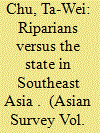

|
|
|
|
|
| Summary/Abstract |
This paper explores the relations between riparian people and states in Southeast Asia’s Mekong-region hydropower projects. These relations are contested: the main actors have been wrestling for supremacy over the hydropower projects, and the struggles are rooted in the people’s relative disempowerment.
|
|
|
|
|
|
|
|
|
|
|
|
|
|
|
|
| 11 |
ID:
174808
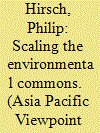

|
|
|
|
|
| Summary/Abstract |
The transboundary environmental commons in Southeast Asia are normally conceived in terms of shared resources and environmental impacts that transcend national borders. The Mekong's ‘fugitive resources’ of water, fish and sediment and the issue of Indonesia's smoke haze drift into Malaysia and Singapore dominate discussion. Assumed national interests shape actors and institutional arrangements for transboundary commons governance. Failure to address the governance challenges is explained in terms of their politico‐cultural failings (e.g. the ‘ASEAN Way’ of non‐interference), the weak regulatory remit of agencies with a specific transboundary governance role (Mekong River Commission), the dominant developmental agenda of subregional cooperative arrangements (Greater Mekong Subregion) or the geopolitical dominance of China (Lancang–Mekong Cooperation). This article builds on these critiques by considering the relationship between the local commons impacted by transboundary projects and the framing of the commons at an inter‐governmental level. It shows that neglect of the local commons and the impacts on them of projects with transboundary effects is partly to be explained by the institutional scaling of the transboundary commons at a country‐to‐country level. It also argues for an expanded notion of transboundary, including investment and governance flows as well as the material environmental footprint of large‐scale investments.
|
|
|
|
|
|
|
|
|
|
|
|
|
|
|
|
| 12 |
ID:
098078
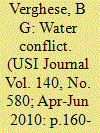

|
|
|
| 13 |
ID:
179655
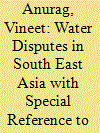

|
|
|
|
|
| Summary/Abstract |
Rivers are the lifeline of human existence , culture and civilisation. It is one of the finest non violent weapons to protect flow of peace , happiness and economic growth but in last couple of decades the world saw its use as a lethal weapon as an instrument of regional politics and political aspirations across the globe. Be it South East Asia , South Asia , Africa or Middle East River water sharing conflicts proved to be detrimental to regional stability as well as regional integration. South east asian countries have been facing river water differences with China for a long time.
|
|
|
|
|
|
|
|
|
|
|
|
|
|
|
|
|
|
|
|
|